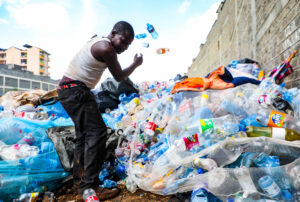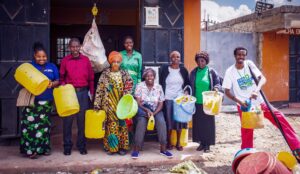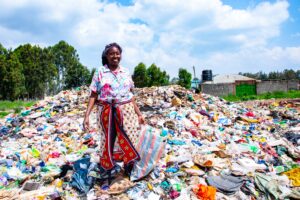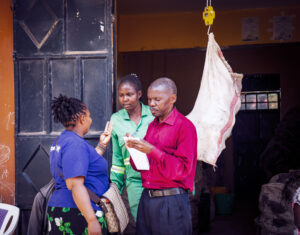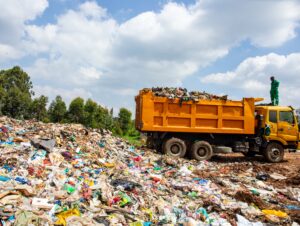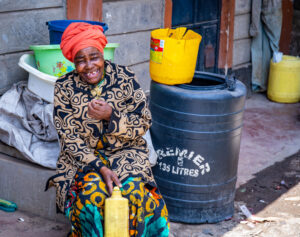Fair Recycling: An Inclusive and Formalised Plastic Recycling Ecosystem in Kenya
The Fair Recycling Project, funded by Danida Market Development Partnerships (DMDP), has successfully established an inclusive and formalized plastic waste recycling ecosystem in Kenya. By integrating informal and marginalized waste collectors, including Kenyans and refugees, into a structured recycling value chain, the project has improved livelihoods, created decent green jobs, and ensured safer working conditions. Leveraging the expertise of the Danish Refugee Council (DRC), Mr. Green Africa (MGA), and Unilever, this initiative has implemented innovative and financially sustainable interventions that promote socio-economic growth and access to the formal economy for waste collectors.
Leveraging Expertise for Impact
DRC’s extensive experience with marginalized communities has been pivotal in identifying, recruiting, and integrating waste collectors into MGA’s operations. MGA has further enhanced the capacities of these integrated waste collectors through a fair, formal, and technology-driven recycling process. This structured approach has enabled waste collectors to progress through various tiers, focusing on increased income and access to socio-economic benefits. Unilever, one of Kenya’s largest Fast-Moving Consumer Goods (FMCG) companies, has supported the project by indirectly procuring MGA’s recycled plastic and advocating for Responsible Business Conduct (RBC) to foster a circular economy in Kenya.
Key Achievements
- Proving MGA’s Business Case: MGA currently serves 7,542 waste collectors, an increase from 2,350 in 2022. The proportion of female waste collectors has more than doubled, demonstrating increased participation and empowerment of women in the waste collection sector. Over 500 refugees are now part of MGA’s supply network, expanding its reach and inclusivity.
- Sustainable Waste Management in Refugee Camps: The project has identified, registered, and trained 225 waste collectors in the Kakuma refugee camp. Of these, 115 are actively trading with MGA, contributing to a newly established Material Recovery Hub that employs 38 individuals and has processed over 18 tons of plastic waste.
- Business Development Services: The project has implemented a comprehensive Business Development Services model, focusing on topics such as child rights, gender-based violence, drug and substance abuse, and legal frameworks related to waste recycling. Waste collectors have been equipped with essential skills in plastic recycling techniques, circular economy models, health and safety, and financial literacy.
Waste collectors organized themselves into 38 groups of 15 members and started community savings initiatives that have raised over 4.72 million Kenyan shillings, significantly enhancing financial empowerment. Members can borrow money at a 5% interest for their own use. Many members have started additional businesses such as poultry farming, pig farming, food vending, and green groceries to increase their household income levels.
- Human-Centered Waste Management Model: The project has redefined waste collection as a dignified profession, providing reliable income and economic opportunities. Formalization and training initiatives have instilled pride and acceptance within the community, transforming waste collection into a valued profession that contributes significantly to environmental sustainability. The project has directly impacted over 2.3 million people across Nairobi and Kakuma through awareness campaigns and direct engagement, including:
- TV shows to create awareness on the project and de-stigmatization of waste Recyclers. TV- Link
- Published News-Paper articles to create awareness on the project and de-stigmatization of waste recyclers Opinion article on Nation Newspaper and DRC website on plastic recycling.
- Production of Campaign materials for de-stigmatization, behavior change and consumer awareness. De – Stigmatization video
- Published project human interest stories on DRC website like the story of Mary and Esther.
- Published press release on Relief Web about the project and its success stories
- Commissioned of the Fair Recycling machine in Kakuma Media link 1 , Media Link 2, Media Link 3, Media Link 4, Media Link 5,
- Ending Child labor and promoting Education for all: The project conducted vulnerability assessments and identified households where children were out of school due to financial constraints. These children were provided with school fees and scholastic materials, enabling them to return to school and their parents aimed with knowledge on the dangerous of child labor. As parents became more financially stable, thanks to the new opportunities provided by the project, the children remained in school.
- Climate Change Mitigation and Environmental Conservation: The project has successfully recovered 922 metric tons of plastic from Nairobi and Kakuma, reducing environmental pollution and promoting sustainable waste management practices. This effort aligns with Kenya’s broader goals of environmental conservation and climate change mitigation.
A Model for Replication
The Fair Recycling Project aims to expand its reach and promote inclusive practices, creating a replicable sustainability model adaptable to other regions and sectors. By emphasizing responsible business conduct, sustainability, and inclusivity, the project seeks to make lasting changes in waste management, benefiting the community and waste collectors. This vision aligns with the broader goals of sustainable development, particularly SDG 8, which promotes inclusive and sustainable economic growth, employment, and decent work for all.
The Fair Recycling Project exemplifies how collaborative efforts can transform environmental challenges into opportunities for economic growth and community development. By formalizing plastic recycling and empowering marginalized waste collectors, the project addresses plastic pollution while promoting sustainable development and social inclusion. This initiative serves as a beacon of hope and a model for replication in other regions grappling with similar challenges.
Administrative Partner Danish Refugee Council (DRC) Key Commercial Partner Unilever Kenya Ltd. Other Partners Mr Green Trading Africa (Kenya) Ltd. Country Kenya Sector Circular economy Open / Closed Closed Duration July 2021 - December 2024 Approval Year 2020




